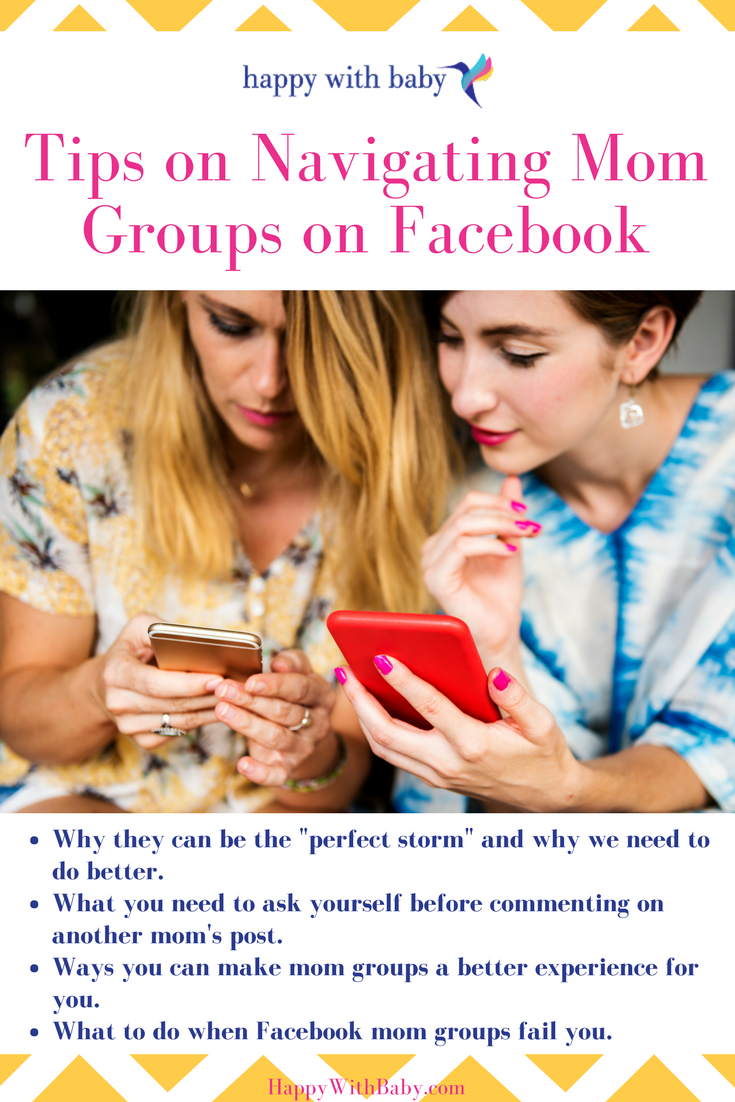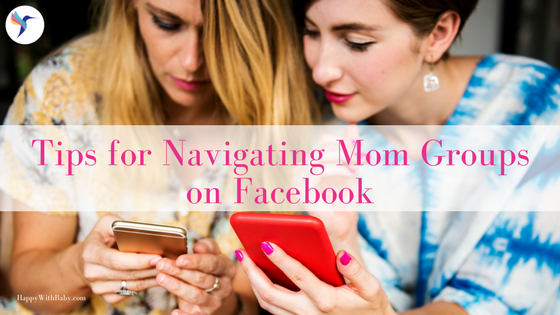Tips for Navigating Mom Groups on Facebook
How do you feel about mom groups on Facebook?
I’ve been asking around about how other moms feel about mom groups on Facebook and other social media and the funny thing is, I’m met with groans every time. I’m not surprised, really. More just disappointed for moms everywhere.
I guess we probably should have predicted this. Road rage has been a problem for probably decades. Social media trolling, though relatively newer, comes out of a similar mentality.
The root cause is our ability to “thingify” a human being. The person we’re engaging with is no longer a person in our minds, but an object. Social media allows us to amplify ourselves, sometimes at the expense of someone else.
Add the “Mommy Wars” into the mix and you have a recipe for disaster. Mom groups on Facebook could be the perfect storm.
As if the Mommy Wars alone weren’t bad enough.
And yet, I see the appeal. Every mom has questions. Every mom needs support. Every mom needs connection. And every mom has a smartphone.
Every mom needs to hang out an extra 5 (or 15?) minutes in the bathroom just to get a break and maybe check their newsfeed. We just need a quick something to make us laugh and feel less isolated.
I’ve been thinking a lot about the #walkup movement too lately. If you’ve been on Facebook in the last month, you’ve likely seen posts encouraging kids to “walk up to the lonely, bullied kid at school” to say hello, to be kind to them. This, instead of walking out in support of gun control. As if it’s an either/or.
Now, I’m not going to make a case for or against gun control here. That’s a whole other conversation. And my intent isn’t to discuss whether being nice to the lonely kid will prevent mass murder or whether it’s victim-blaming.
What interests me with the whole #walkup trend is that we want to teach our kids to be nice. WE need to be nice first. It starts with us. We can’t tell our kids one thing and then do another. That often doesn’t work out in our favor.
Bullying and cruelty happen online among adults all the time. And those hurts are just as real as the ones that happen out in the world. The point is, we don’t know what someone else is going through. And when it comes to parenthood, we’re all fighting our own battles and trying to do the best we can in what can often be one of the loneliest experiences we’ll ever know.
So, for all the good and bad that online mom groups offer, how to we navigate them to get the support we’re looking for?
Here are my suggestions...
Before you get too involved, do these things first:
-
Think about what matters most to you in a support group. Are you looking for local moms to meet up with? Runner moms? Breastfeeding support? Support for interracial families or for those who are finally having their Rainbow Baby?
-
Spend some time just being a quiet observer of the group. Maybe even try the search feature to check out some different topics. What types of questions are people posting? How do people respond? Does it feel like a place you’d want to hang out? It’s good to get a sense of what the group is like and what you’re in for before you ever make a first post.
-
Know who are the admins/moderators are. How active or involved in the group are they? Managing a large group well takes a LOT of time and effort and often that labor is unpaid. So, do give admins the benefit of the doubt, but also make a mental note when a group frequently has commenters saying, “Where are the admins? Why aren’t they stepping in here?” The groups without good management will become obvious pretty quickly.

-
Would you say this to a friend? Would you say this to someone’s face, friend or stranger? Remember that there is another human being on the receiving end, not just pixels on a screen.
-
Is what I'm about to say helpful? Does it actually answer their question? Responding “Breast is best” to someone asking a question about which brand of formula is best, for example, isn’t helpful, nor does it answer their question.
-
Would you want someone to talk to or about your child this way? Would you talk to or about your own child this way? Pretend a friend is asking this question from your kitchen table and your little one is sitting on your lap.
When you post in a group for support or answers, keep yourself in check with these tips:
-
Try pre-empting your post with “I am looking for tips from people who have experience with ______.” You might also add “I am not looking for your opinion on_____.” Or, “I’m not interested in the debate around ______, I only want advice from parents who chose to do it this way.” Clarifying what kind of response you’re looking for might head off those interested in taking the conversation in a different direction.
-
When reading others’ comments on your post, always take a step back and do a self check-in before responding. Is there a comment that has spiked your heart rate? If so, give yourself some time and space to collect your thoughts and feel calmer before responding.
-
Remind yourself that people often mean well. What they’re saying just might come off wrong. Sarcasm or dry humor often don’t translate well in social media threads, for example. There is so much extra information in tone of voice, facial expression and body language when we are talking face-to-face with someone, but social media is stripped of all that. Try asking for clarification before jumping to conclusions or getting defensive.
-
If someone does usurp your thread by instigating debate, you have two choices: 1. You can hide their comment from view by clicking on the “...” to the right of their comment. Or, 2. Kindly remind them that their response doesn’t answer your question. Tell them that while the conversation they’re encouraging might be worthwhile and helpful for some moms, it might work better in a separate thread altogether because it isn’t serving to solve the problem you’re seeking help with.
-
If things are veering off course in a thread you’ve initiated--or even if you see things going sour on another post that you’re following--rather than trying to resolve the issue on your own, tag an admin in the comments to bring some awareness to it. Politely asking for help is the way to go, of course, since making enemies with the admins will likely result in your getting the boot, rather than the offending members in a thread.
-
If someone is sending you inappropriate, annoying or offensive direct messages that were prompted by a post you made in a Facebook group, you can block that person from contacting you by going to their profile page, clicking the “...” next to the message button, then clicking “Block”. You should also contact the admins to let them know that this happened, as this is typically against the policies for most groups.
-
If you find that there’s a “repeat offender” in a group, start blocking or hiding their posts. The more often you do that, Facebook will learn that you’re not interested in seeing posts from that person. You can also block a person from commenting on your posts by clicking on their profile, then blocking them.
-
Remember that you do have control over what you see in your feeds. In Facebook, you can turn off notifications on a post if it is only causing you grief or annoyance. You can turn off comments if things go sour. You can also hide all posts from a group if you’re getting inundated and only visit the group when you have a question. On Twitter, you can block specific hashtags, if something is triggering you. And with all platforms, you can always unfollow or leave pages, profiles or groups that are stealing your joy.
And lastly, I’ll share this advice I loved from friend, colleague, and parent coach, Mercedes Samudio, LCSW:
“Being in these groups isn’t a contract you’ve signed, you can leave when you want - whether it be the group or the comment thread. Remember that you have permission to find a group that fills you up, energizes you, and supports you.
And, be aware that you don’t have to only be in mom groups. I always encourage my moms to also find groups in other areas of their life and connect with these groups for support too. You may even find better support for instance in a business building group where there’s a thread about how to build your business as a mom. Think outside the box, and search for support that helps build up your whole self, not just your parenting self.”
I know that seeking help online is incredibly convenient and, when the groups are really good ones, can provide you with that little extra bit of reassurance and connection.
But, if social media fails to offer you the support you need or you feel more frustrated than you do uplifted, remember that there are in-person groups you can join instead. And, rather than crowdsourcing your parenting decisions and getting more confused, there are experts you can talk to that will offer the right information you’re looking for.
You might even find more support in a little face-to-face small talk with another mom at the park than you would from a massive group of online avatars.
Pay attention to how you feel during all of your interactions. Let that be your guide.
Above all, we need to remember that we are all human. We’ll all stumble or accidentally offend someone every now and then, whether it’s online or out in the “real world." The best thing you can do is own up to it and apologize when necessary, clarify what you meant, and always stay curious and open to learning from other perspectives.
As they say on social media memes: “Behind every great kid is a mom who’s pretty sure she’s screwing it all up.” We’re all just trying to do our best.
Subscribe
Sign up to get the latest weekly blogs sent straight to your inbox



0 comments
Leave a comment
Please log in or register to post a comment